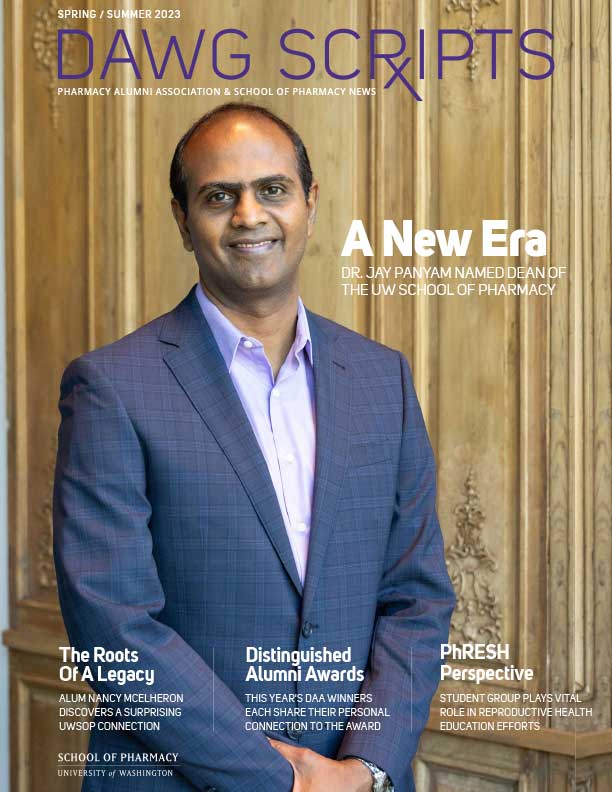DAWG SCRIPTS
Spring/Summer 2023
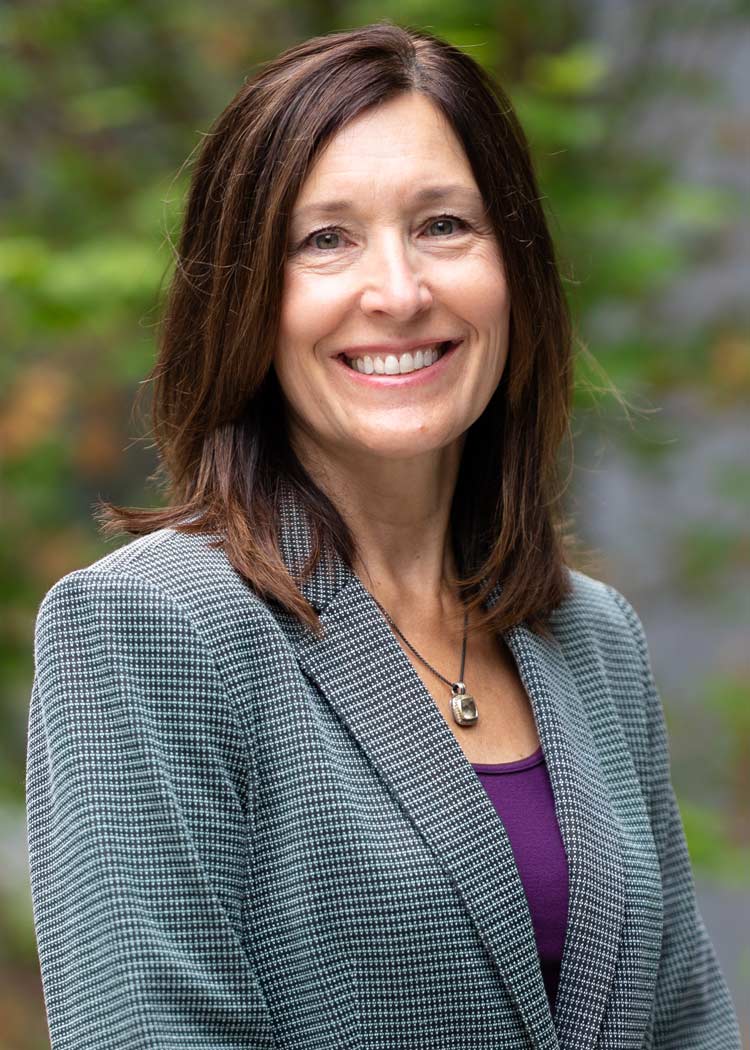
From the Dean
It is hard to believe I’ve been serving as the UW School of Pharmacy’s Interim Dean for almost a year now, and by the time you read the next issue of Dawg Scripts, I will have handed over the reins to our School’s new Dean, Dr. Jay Panyam. We’re so excited to have Jay join us, and I know you’ll enjoy many opportunities to get to know him and his family this year when he settles in on campus full time.
I am grateful for the opportunity to help our School navigate this year, and it has been a very successful one. We have witnessed some outstanding accomplishments throughout the year, including achieving an 87% residency match rate, the best in the history of the School, and one of the top residency match rates in the country. We also battled the tide of declining enrollments across the country and posted 107 admitted students for the class of 2027 – right at the goal we set. Our research programs are strong and continue to develop. We onboarded several new talented faculty this year who are brilliant scientists and practitioners, and are poised to continue our leadership in the pharmacy field.
Another success story from the past year includes our accreditation reviews, which re-emphasized the strength of our academic programs. On the tail-end of a pandemic, our PharmD program received the highest marks with full accreditation for 8 years, and our Graduate Programs were equally as successful, with continuation approval of all three programs, inclusive of both masters and PhD degrees, for the next 10 years.
Beyond these wonderful achievements, a key goal this year has been to help us all feel reconnected after a few years of remote or more limited in-person connections, and to strengthen our sense of belonging as a community. Through engagement with several School groups, including our elected Faculty Council and Executive Committee, we continued the important focus on ensuring salary levels for faculty and staff were appropriate and that people felt a renewed sense of being valued and seen for the outstanding work they do. I think we’ve made great strides in this regard, and I know we’ll continue to strengthen those efforts.
Another component connecting our community throughout the year involved investing in our vision for the new PharmD Purple Curriculum, which has been a tremendous success. Thanks to the collaborative efforts of our UWSOP colleagues, including many of you as alumni, faculty, staff and preceptors, we are on a positive path to fulfilling that vision. In fact, this year we got to witness the curriculum’s first graduating class of “Husky Pharmacists”, an exciting and heartwarming ceremony we celebrated in June. This outstanding accomplishment is the culmination of a tremendous amount of dedication, talent, and perseverance of so many. I couldn’t be more thrilled and proud to have been a part of this effort.
These accomplishments are symbolic of the power and reach of this entire community, which never ceases to amaze me. Your efforts as alumni have played no small part in our School’s success, and I want to express to you my gratitude for your partnership, support and generosity over the last year – it has been my pleasure to serve you as Interim Dean, and an honor to be of support to this precious community I call home. I’m excited to join you as an alum and celebrate the many extraordinary successes to come.
Peggy Soule Odegard BS Pharm ’85, PharmD ‘90
Interim Dean and Professor


I am thrilled about joining and leading this community of trailblazers.
-Jay Panyam
UWSOP Welcomes New Dean, Dr. Jay Panyam
On the eve of a busy summer preparing to move his family from Philadelphia to Seattle, Dr. Jay Panyam graciously took time to talk about his role as the UW School of Pharmacy’s new Dean.
Looking back, what initially sparked your interest in the field of pharmacy?
I grew up watching movies like The Absent- Minded Professor and Fantastic Voyage, and later reading medical mysteries by Robin Cook. As a kid, I had imagined making scientific discoveries and finding new drugs, like in those movies and books.
I initially wanted to go to medical school because I used to think physicians find new drugs. Once I realized that drugs were a purview of pharmacists and pharmaceutical scientists, pharmacy became my passion.
After my degree in pharmacy, I wanted to pursue research in pharmaceutical sciences, especially in the area of novel formulations, and so continued on to graduate school. I am incredibly fortunate to have been able to pursue a career that I dreamt of as a kid!
What excites you about this role and our program?
UW School of Pharmacy has been a leader in all aspects of pharmacy and pharmaceutical sciences – education, scholarship, and practice. The faculty, students and alumni have contributed to practice advances and advocacy that have made Washington one of the most progressive states to practice in. Pharmaceutical sciences faculty members are highly respected researchers in the areas of drug metabolism, toxicology, and bioanalytical chemistry, as well as drug delivery and disposition. I am thrilled about joining and leading this community of trailblazers.
We have a very passionate, dedicated alumni community. How do you see their partnership with the School evolving in the coming years?
I believe alumni are a cornerstone of the School and are our best ambassadors.
During my time at Temple, I worked closely with the school’s alumni on many different fronts. Many alumni members participated as recruiters and interviewers for PharmD admissions, judges for research recognition day posters, mentors and preceptors for professional pharmacy and pharmaceutical sciences graduate students. I worked closely with the alumni association to help raise scholarship funds through organized events, such as an annual golf tournament and 5K race.
I expect to build a similar close relationship with UWSOP alumni to advance the mission of the school.
What are you and your family most looking forward to about living in the Pacific Northwest?
The great outdoors! We cannot wait to take in the breathtaking scenery, great many national parks, and the proximity to both lakes and hills. My wife and I are runners, and we are excited to run on the many natural trails that Seattle has to offer.
2023 Dean’s Recognition Reception
The 2023 edition of the UWSOP Dean’s Recognition Reception, held at UW’s Burke Museum, welcomed UWSOP alumni, faculty and staff for an evening of reconnection and celebration. View a gallery of images from the event.
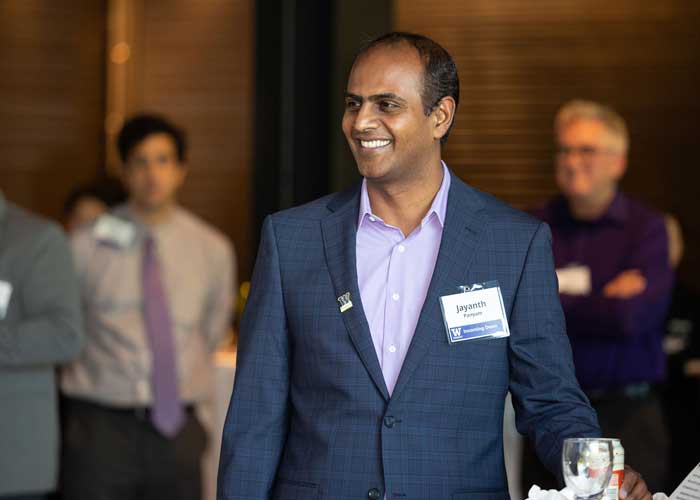
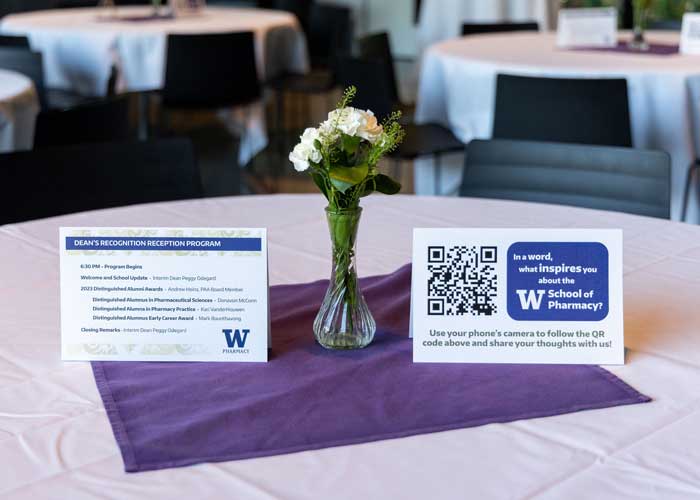
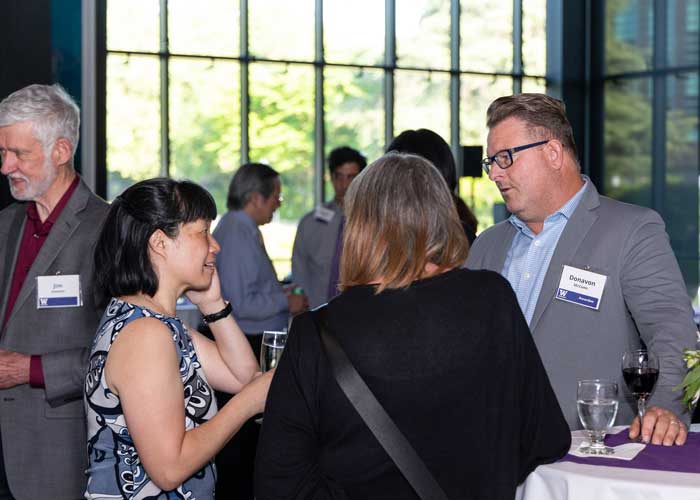
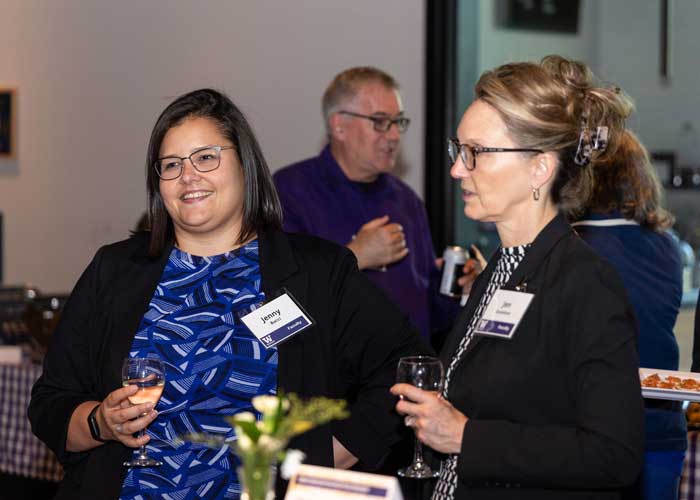
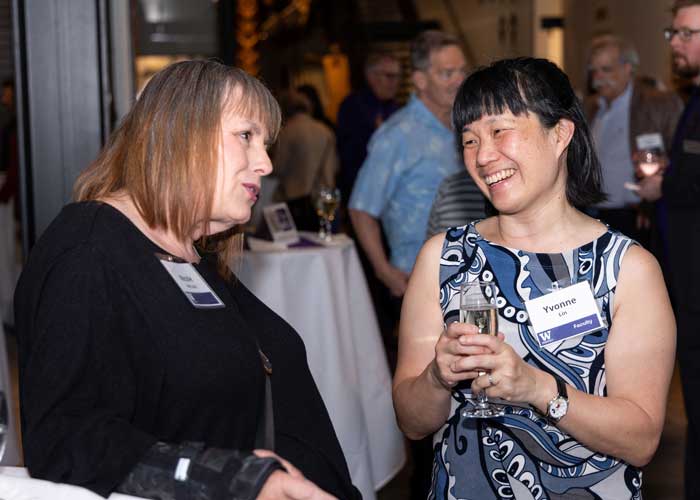
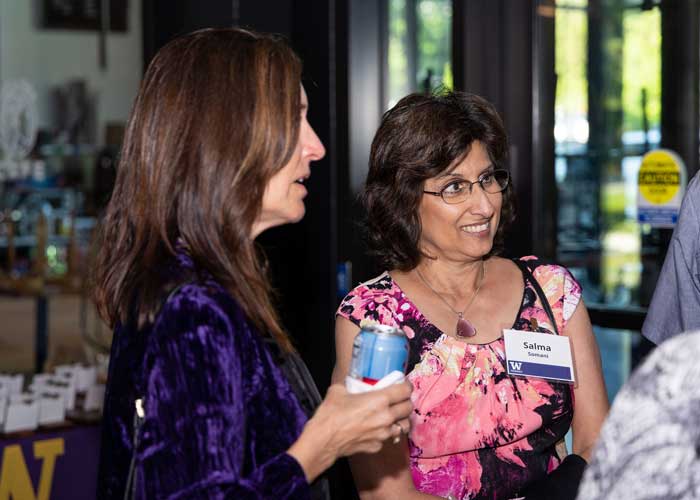
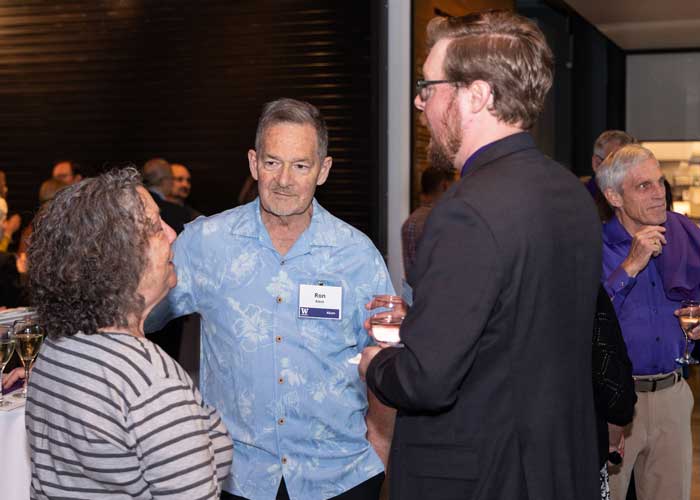
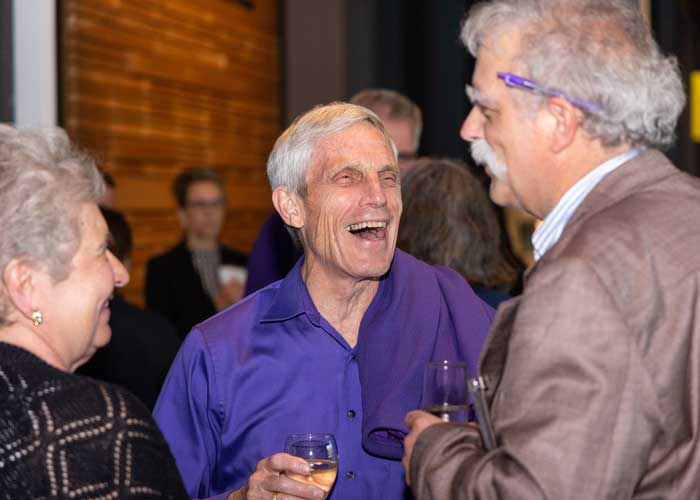
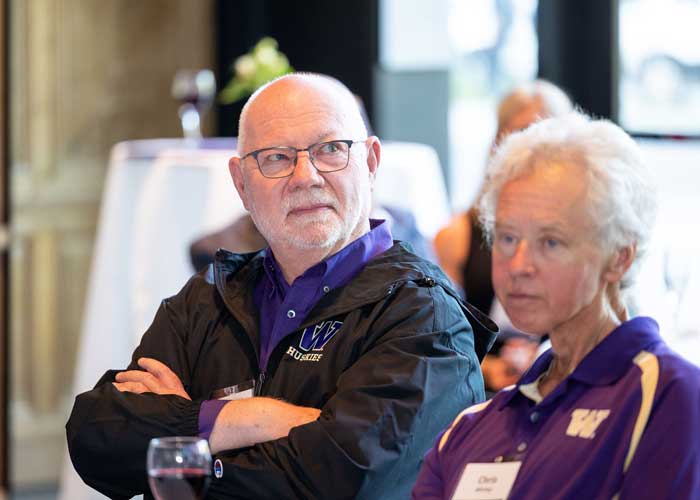
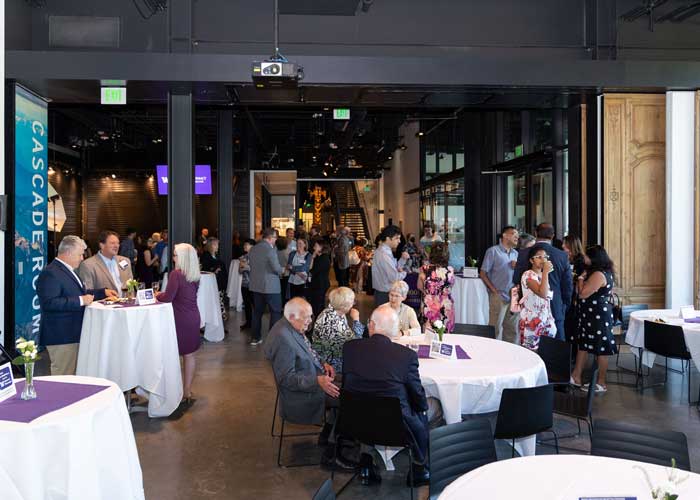
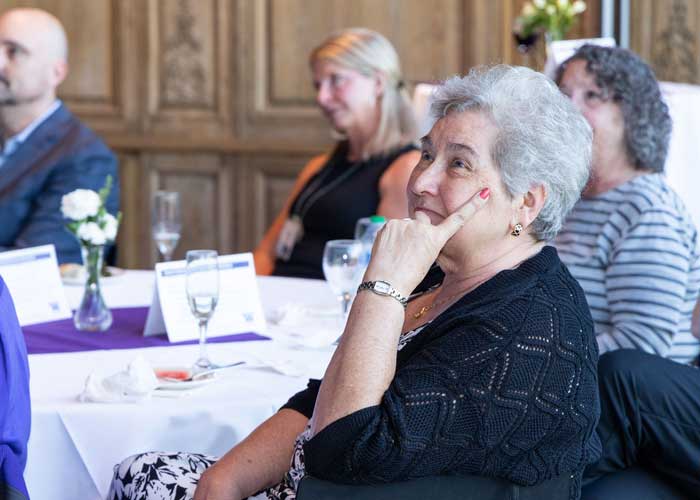
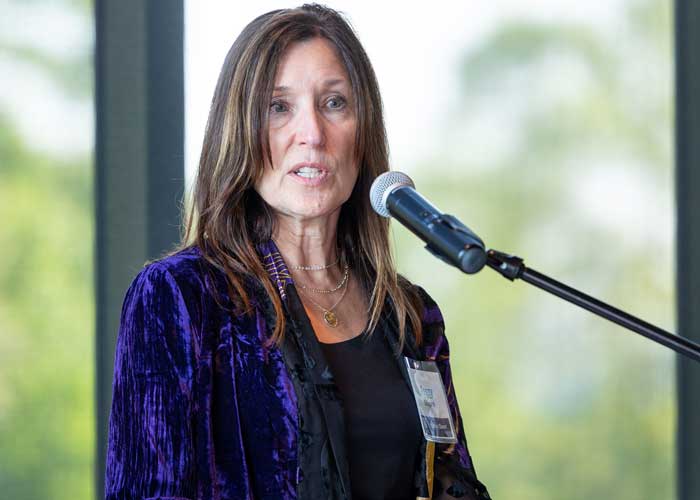
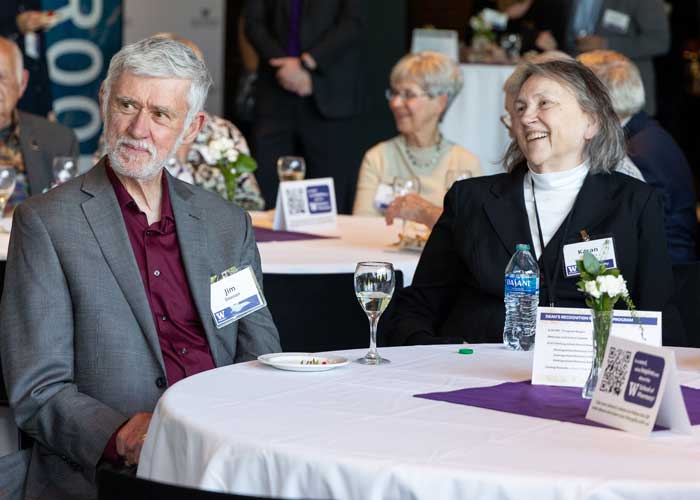
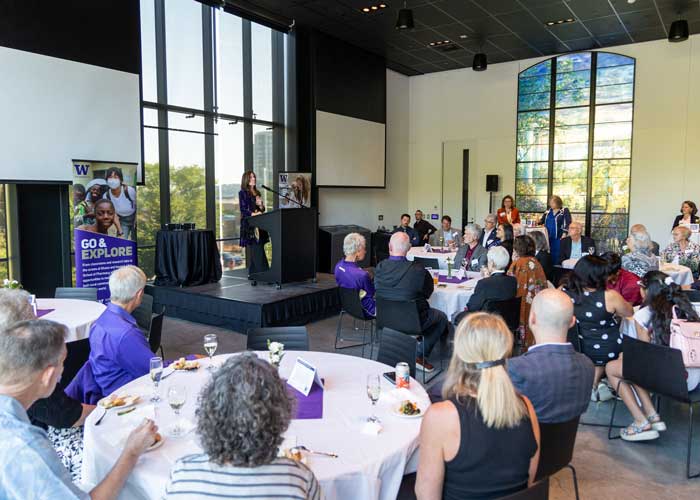
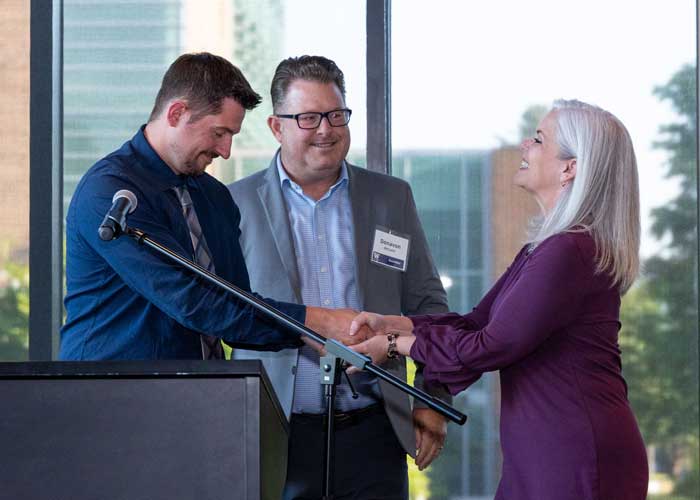
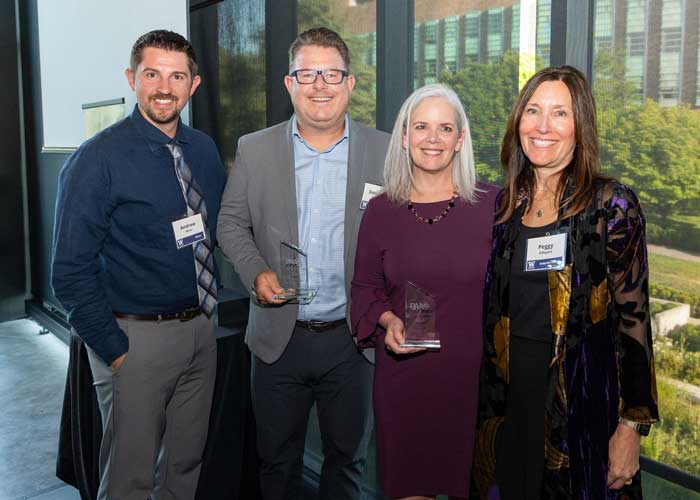
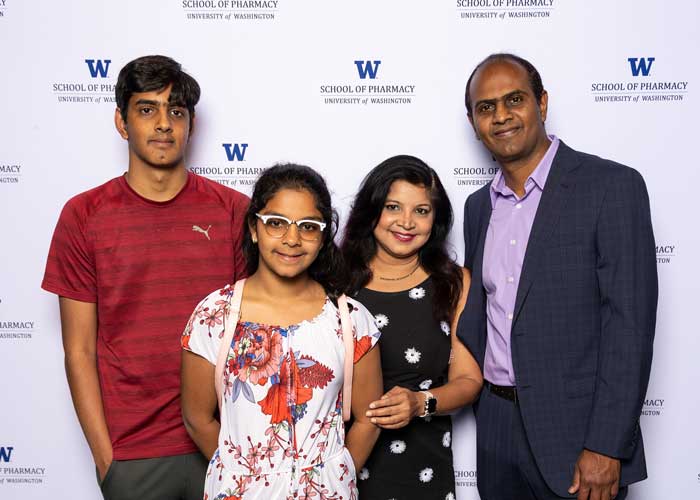
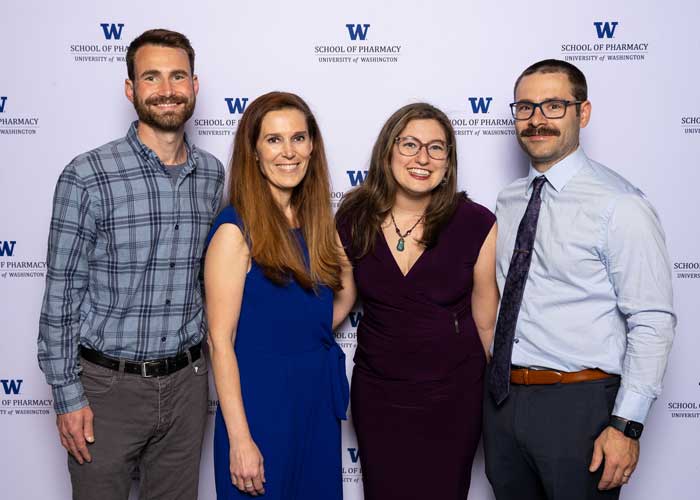
The Roots of a Legacy
Nancy McElheron, ’92, was in search of her father’s lineage, but a random DNA test revealed an unexpected connection with a UWSOP legend.
Tacoma, Washington native and UWSOP alum Nancy McElheron, ’92, spent 27 years in the pharmacy arena before retiring in 2019. And though a long and fulfilling professional tenure was coming to an end at that time, a brand new, and very personal journey was just beginning.
For years, Nancy had been curious about the origins of her father, William Gregory, a successful accountant, influential community leader and UW alum who passed away when she was 27. A beloved father of three daughters (Nancy and her sisters Kathryn and Joan), Mr. Gregory had been adopted as a child, and his lineage had always been a bit of a mystery to his children, so with her retirement now freeing up some extra time, Nancy put her UWSOP-ingrained research skills to work in a different arena – her family history – and began digging… and digging…
…and digging.
“I went through all the King County records, the courthouse – even the libraries,” she recalled. “And I got nowhere. They wouldn’t open his adoption and birth records without his signature.”
Exasperated on the heels of that unsuccessful expedition, Nancy and her sisters took the research to the next level and hired an investigator who was finally able to unseal her father’s adoption records, resulting in the discovery that he had been born in the Philippines in 1923 to Lois Richards and “Joe Filipino”, who, as discovered later, was an international Filipino undergraduate student studying business at the UW. For Nancy and her sisters, this reveal cleared the path to seek out other branches of their family tree, so they continued their research journey through the popular DNA testing site 23andMe. A few weeks passed, and when the results arrived, Nancy and her family discovered that those family roots were much deeper and more expansive than they had ever imagined.
“There were 20 or 30 names that were potentially relatives of ours,” she said. “And the day after I received the list, I was contacted through 23andMe by a woman named GiGi Orosa. She said, ‘I think we might be cousins’, so I sent her a picture of my Dad and asked, ‘Could he be from your family?’ She then sent me a picture of her great grandfather, and they looked exactly alike.
“I burst into tears.”
After years of searching and researching, Nancy finally found her father’s family. But the story definitely didn’t end there. Two years ago, Nancy flew to New York to meet some of her ‘new’ family, the Orosas, and soon discovered she was also related someone who just happened to not only be one of the UWSOP’s most revered alums, but also a pharmacy pioneer in the field of food chemistry – Maria Orosa.
Prior to this stunning discovery, Nancy had never heard of Maria, and the fact that she also followed a pharmacy career path that led her to the UW – just like her famous ancestor – was pure coincidence.
“It’s so strange that we both happened to not only choose pharmacy as a career, but chose the UW to study – maybe it’s in the DNA,” she joked.
COURAGE BY EXAMPLE
“For a woman to have the courage to step on a steamship in the 1900s, travel all the way to the the United States, support herself while earning her education (she worked in the canneries in Alaska to support herself financially), and accomplish what she did, was absolutely amazing,” said Nancy. “After accomplishing all that she did here, and breaking down those barriers, she decided to leave to help her own people. That speaks to her commitment to healthcare and to serve her communities.”
After graduating from the UW, Maria returned to the Philippines where her vision for a self-sustaining country would lead to her many innovations around fermenting, dehydrating, and preserving the local plants and animals. Though her most famous food invention is banana ketchup, in which she reimagined the popular sauce by replacing the outsourced tomatoes with locally abundant bananas, Maria’s Soyalac (a protein-rich powered soybean product) and Darak Cookies (made from rice bran and containing Vitamins A, D, E and B complexes) remain her greatest achievements. During World War II, she smuggled those goods into concentration camps, saving thousands of Filipino and American prisoners of war from starvation.
“I think it’s fascinating, because of the culture now, where there’s more appreciation for accomplishments of women like Maria,” said Nancy. “I wish I would’ve known about her earlier.
“She would have been amazing to meet.”
A Legend’s Journey
Maria Orosa was a food technologist, pharmaceutical chemist, humanitarian and war hero. To tell her whole story would fill an entire book, so here are a few of many important accomplishments that are a part of this legendary UW pharmacist’s enduring legacy:
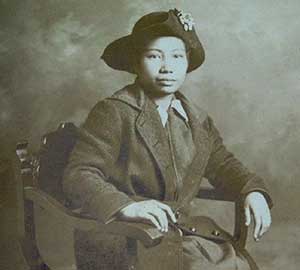
- Maria moved to the United States at the age of 23 (some accounts say she was a stowaway). She was a government-sponsored scholar at the University of Washington. There, she earned a bachelors and a masters degree in pharmaceutical chemistry, as well as one in food chemistry. During her education, Maria would spend her summer breaks working in the Alaskan canneries.
- Though she earned a position as an assistant chemist for the state of Washington in 1922, she instead chose to return to the Philippines. Upon her return, she taught home economics at Centro Escolar University and would later transfer to the Bureau of Science organizing the food preservation division.
- A humanitarian at heart, Maria had a vision of empowering the Filipino family. She launched Health, Heart, Head and Hand (4-H) Clubs. This organization brought herself and other educators into rural areas and barrios to teach women how to raise poultry and preserve food, as well as how to prepare and plan meals. She developed over 400 recipes along the way, and by 1924, the organization had over 22,000 members.
- The Bureau of Science recognized Maria’s efforts and promoted her to head of the Home Economics Division and the Division of Food Preservation. Her work with the bureau would send her all over the world to research canning and preserving technologies.
- Some of Maria’s most known contributions to the food world came during World War II. She was beloved within Filipino households for her banana ketchup, but became a war hero for her two other inventions: Soyalac and Darak. Soyalac is a protein-rich, highly nutritious powdered soybean product. Darak is a rice by-product that is high in B vitamins, thiamine, and vitamins A, D, and E (intended to fight the vitamin B deficiency disease, beriberi). Ironically, while saving American and Filipino lives, Maria was killed by friendly U.S. fire during the war.
Origin Story: The History of Maria Orosa’s Famous Banana Ketchup
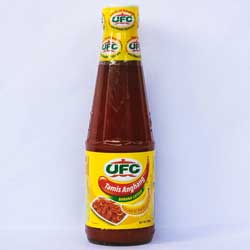
When Americans colonized the Philippines in 1898, they introduced elements of their cuisine, and ketchup became a popular condiment. But it was expensive to import, and tomatoes would not thrive in the tropical Philippine climate. So Maria set about making her own version. Banana ketchup, which she created in the 1930s, is smoother and more viscous than the tomato version, making it a bit harder to shake out of the bottle. The concoction – made of hardy local saba bananas, sugar, vinegar and spices, with a dash of red coloring to make it look more like the imported version – is now a staple on the shelves of Philippine grocery stores.
Congratulations 2022 DAA Recipients
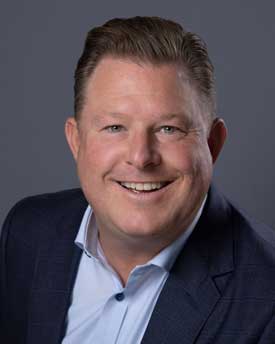
Donovan McConn, ’01
VP, Non-Clinical Development, XinThera, Inc.
“I’m grateful to the UW community for essentially giving me a network that has been incredibly valuable for my whole career, and for giving me training that was free. People before me had to raise money to support graduate students when I was there, and as a student I received fellowship money for no skill of my own, but because people were financially helping the School. Now, I’m blessed to have that responsibility to help out in any way I can.”
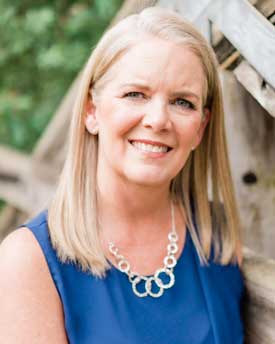
Kari VanderHouwen, ’92
Pharmacist & Owner, Duvall Family Drugs
“This award means the world to me. Promoting and supporting pharmacy, in Washington state and across the nation, is, again, a passion for me, and to be recognized for my contributions in making sure that that’s happened is amazing. I’m just a small, single store owner. We’re just living in our little space and doing what we do, and supporting our community. For people to recognize that is special.”
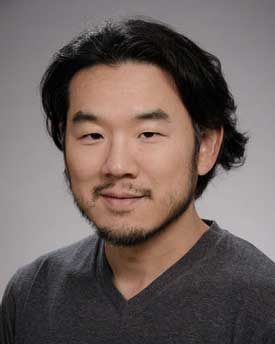
Mark Bounthavong, ’18
Associate Professor of Clinical Pharmacy, UC San Diego
“Being recognized by the UW Pharmacy Alumni Association is really a big thank you to those individuals who have helped me to shape my career and character. I really would not be here today without their love and support. This award is a renewal of my commitment to the mission of the UWSOP. I hope I live up to that and will maintain these values at my own institution and throughout my career.”
Unable to attend the Dean’s Recognition Reception in May? Watch the full Distinguished Alumni Award presentation video:

My passionate goals around patient access to care, equitable access to care – you don’t retire from that work.
-Don Downing
A UW Pharmacy Pioneer Moves On to New Adventures
After 27 years of service, Don Downing, ’75, will retire from the UWSOP this summer. He took time to sit down with us and share some memories of a storied career.
WHY DID YOU FEEL NOW IS THE TIME TO RETIRE?
Well, I don’t really feel like I’m retiring. My passionate goals around patient access to care, equitable access to care – you don’t retire from that work. I’m 72 years old now, and I’ve been doing this for the last 27 years, with no regrets. But I have more things to do. My wife and I want to travel – we have an Airstream trailer. And we have two grandkids that need more time with grandpa. And I’m also playing right now with four (four!) musical groups. It’s time to hand the baton off to young people with fresh ideas.
LET’S GO BACK IN TIME A BIT. WHERE DID YOU GROW UP?
I was born and raised in Port Angeles on the Olympic Peninsula. I grew up in a town where my mother’s father had been mayor and port commissioner and was very involved in civic life and in the town, and although he died while my mom was pregnant with me, I grew up with him, idolizing him. I spent my childhood on the north end of the Olympic Peninsula headquarters in Olympic National Park. The mountains were right behind me, and the water – lakes and streams – was right in front of me, so it was a playground.
Growing up in a small town gave me a blue collar, grassroots education, but I also had multiple friends who are Native American because we had the Lower Elwha Tribe, the Makah Tribe, and the James Town S’Klallam Tribe there were all nearby and had a lot of friends who are native and gave me insights into marginalized human beings.
THAT INSPIRED YOUR WORK WITH INDIGENOUS TRIBES?
Yeah, without a doubt. It really opened my eyes. I saw how they were discriminated against and had to abandon their culture – dress and act like everyone else – just to fit in. That had a big impact on me. I guess I look back and think it’s no wonder I got involved in starting up the first urban tribal clinic in the country, the Seattle Indian Health Board Clinic – and the other clinics that followed. That really came from, I think, a sensitivity to the unmet needs of that population of people.
ADVICE TO ASPIRING PHARMACISTS?
I talk to students a lot about remembering where your covenant is. You can graduate really smart and know a lot of stuff, but you’ve got to be able to apply it to the patient’s needs – and not by just selling them more and more drugs. And so that’s been sort of my mantra for quite some time: “Patient first, patient first, patient first.”
WHAT ARE YOU MOST PROUD OF IN YOUR CAREER?
I think there’s two things. My work in reproductive health – it turns out, there aren’t that many of us in the pharmacy world involved in that. And especially in today’s environment, where there’s assaults on women’s access to health care every single day. I’m very proud that I’ve stood up and done meaningful things to improve access, despite that often being the most unpopular thing I could have done. Yeah. Emotionally, that’s probably what I’m most proud of. I think, policy wise, it’s been creating the pharmacist as a medical provider bill in the state of Washington. I took me 15 years to do that, and in the end, to succeed after 15 years working on it – I’m very proud of that. I’m hoping that it’ll transform our profession in this state and provide a role model for pharmacists everywhere.

I hope to one day see this in the market– affordable, and accessible to everyone around the world.
-Andy Kim (Trial Volunteer)
Clinical Trial for Pioneering HIV Long-Acting Treatment Underway
In May, the UW TLC-ART program, a leading innovator in long-acting and Targeted therapy, announced the initiation of the first-in-human clinical trial for its groundbreaking 3-HIV drug combination product, TLC-ART 101. This trial, funded by the National Institutes of Health (NIH), represents a significant milestone in UW TLC-ART’s mission to revolutionize HIV treatment and improve patient outcomes.
TLC-ART’s drug-combination nanoparticle (DcNP) platform and the TLC-ART 101 product have emerged as a result of a grant awarded in 2014 and funded in July 2015 to Principal Investigators, Dr. Rodney JY Ho and Dr. Ann C Collier. Leveraging their expertise and the dedication of the interdisciplinary team – including the experience of clinical director Dr. Rachel Bender Ignacio – the UW Pharmacy and Medicine team has developed TLC-ART 101, a novel, long-acting three HIV-drugs combined in one injection. Currently long-acting HIV treatment contains only a single drug. Subcutaneous injection provides option for self-administration like that for insulin self-injection by patients. These 3 HIV drugs have over 20 years of demonstrated safety and efficacy when taken orally.
The objective of the NIH supported first-in-human clinical trial is to assess the safety and pharmacokinetics of TLC-ART 101. By investigating the sustained and extended presence of the 3 HIV drug levels in the body from a single injection, the UW TLC-ART team aims to provide an alternative, and potentially more effective treatment option for individuals who face challenges in adhering to daily HIV medication or prefer non-oral administration. Treatment interruption and pill stoppage leads to HIV rebound and progression to AIDS. TLC-ART 101 is intended to maximally suppress HIV with less frequent dosing.
Upon successful completion of the trial, the research team plans to upgrade the nanoparticle platform using the most commonly used current antiretroviral drugs for HIV treatment worldwide. Subsequent studies will focus on evaluating the efficacy of viral suppression and the safety of the product in people living with HIV.
“The initiation of the first-in-human clinical trial for TLC-ART 101 marks a significant milestone in our journey towards developing a low-cost, globally accessible HIV treatment option,” said Dr. Rachel Bender Ignacio, Director of UW Positive Research and Protocol Chair and Principal Investigator of the TLC-ART 101 clinical trial. “We are committed to addressing the challenges faced by individuals in low and middle-income countries, as well as those who experience barriers to daily pill-taking due to stigma, or other reasons.”
Andy Kim, a research scientist and engineer at the UW Department of Comparative Medicine, volunteered for the trial and hopes the project will ensure HIV eventually goes the way of polio.
“This isn’t about getting my name in the papers, but more about doing good for the community, for society, and for all of those who may be affected by the disease,” he said.
“I hope to one day see this in the market – affordable, and accessible to everyone around the world.”
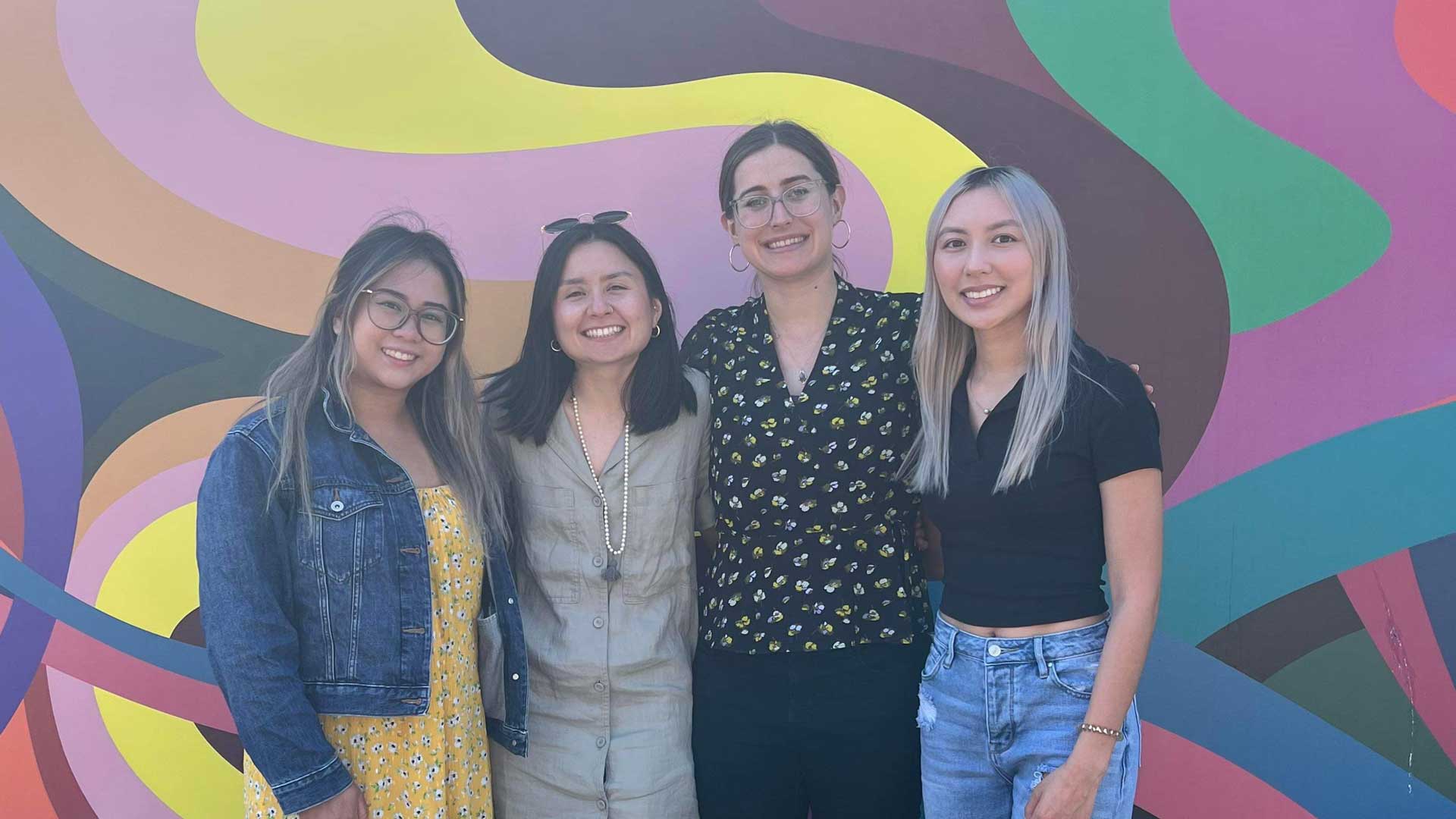
(L-to-R): Alexis Jasmine Quisao, Zoe Nicole Amaris, Garbo Grossman, Kaylin Phan.
A PhRESH Perspective
UW’s first Emergency Contraception vending machine a collaborative effort.
Last summer, thanks to a resolution made by the Associated Students of the University of Washington (ASUW) to President Cauce, the UW’s first Emergency Contraception vending machine debuted at Odegard Library on UW campus.
A successful endeavor, with plans for additional vending machines in the works, the project shines as an example of the strength of UW’s collaborative, unit-wide efforts.
When the ASUW student resolution requesting a machine was initially proposed, Chris Jaehne, who manages special projects for the Office of the Vice President for Student Life, began doing research as to how UW could follow the lead of other schools hosting EC vending machines.
“After the Supreme Court decision to overthrow Rowe v Wade, there was a lot of energy from students on college campuses to install reproductive health care machines,” he said. “I consulted with colleagues at UC Davis, who had also procured a machine, and Denzil Suite (UW Vice President of Student Life) connected me with Ryan Hansen (’03,’12) in the School of Pharmacy. Ryan made me aware of PhRESH (Pharmacists for Reproductive Education and Sexual Health), who were interested in helping manage the operations for the machine.”
Because campus vendor Canteen wasn’t initially interested in partnering to sponsor the machine, Chris had to determine an alternate route to complete such business-related tasks as procuring products for the machine and processing the transactions. That’s where Ryan stepped in to help mitigate that challenge. The UWSOP Department of Pharmacy Chair is also the Executive Director of the Kelley-Ross Foundation, and he offered assistance through the Foundation to process payments using their credit card license.
“It’s been going really well,” said Chris, who also works with Rubenstein Pharmacy in Hall Health to source products for the machine. “Canteen ultimately sold us a used machine and helped me get it set up, and the pharmacy students learned how to program the machine and stock it on a weekly basis.”
One of those students involved with the project is Alexis Jasmine Quisao, a second-year pharmacy student and PhRESH president. A core value deeply rooted in her pharmacy education served as one of the primary drivers for Alex to get involved with the effort: the importance of accessibility.
“Advocating for accessibility to healthcare for patients is something that is emphasized at the start of pharmacy school,” she said, “so it makes the most sense for PhRESH to be responsible for helping manage this project.”
In addition to access and affordability, Alexis feels the machine service offers students an additional and important advantage they wouldn’t normally receive at a traditional pharmacy – the luxury of discretion.
“The process is convenient and discreet, and it also helps people avoid feeling additional stress on top of an already stressful situation,” she said. “As an example, when you go to a pharmacy to get Plan B, you have to talk to more people and take extra steps to get the medication. I like to think the convenience of this vending machine helps avoid those hurtles, while also making it available at an affordable cost.”
Alexis, whose myriad responsibilities includes creating a weekly schedule for restocking, and ordering medications from Hall Health Pharmacy, says the machine dispenses a wide variety of commonly used over-the-counter medications and feminine products, including pregnancy tests, pads, tampons, loratadine, acetaminophen, and diphenhydramine. She hopes that, with the success of this program, other schools will follow suit and sponsor EC vending machines of their own.
“Hopefully more schools will take on a project like this and provide the support and guidance to make it successful,” she said. “Even though we do not directly interact with whoever is using the vending machine to get Plan B, I feel fulfilled as a pharmacy student to take on this project. I know I’m helping make a difference and advocating for the community and reproductive health.”
According to Chris, sales have been brisk. On average, the machine produces about 130 Plan B sales per month, and all products are generic versions, allowing UW to offer reasonable prices – a core purpose of the project.
“I think it’s been a fantastic demonstration of collaboration across different units in the university,” said Ryan Hansen. “The students really stepped up.”
In addition to managing the EC vending machine project, PhRESH students have engaged with the public at events such as the University District’s Farmer’s Market. Recently, student volunteers from PhRESH, the Schools of Medicine and Nursing, along with faculty and staff from the UWSOP and UW Alumni Association, distributed more than 400 Plan B kits at the University District Street Fair. The event was a huge success, and UW volunteers will return this fall to distribute more kits at the University District’s Farmer’s Market.
Watch PhRESH volunteers in action at the U-District Street Fair:
PhRESH Partnership: U-District Street Fair from SB on Vimeo.

Pharmacy Fridays Podcast
The UWSOP’s new podcast, Pharmacy Fridays, features conversations with alumni, faculty, students, and other friends in pharmacy about timely, field-related topics. Hosted by Rachel Firebaugh, UWSOP Clinical Assistant Professor.
Pharmacy Frontline: Schaffner Pharmacy
UWSOP alum Chris Schaffner, ’07, discusses how his time at the School shaped his career and his approach to the pharmacy profession.
UWSOP PHARMACY FRONTLINE: SCHAFFNER PHARMACY from UWSOP Marketing on Vimeo.
Originally published Summer 2023
